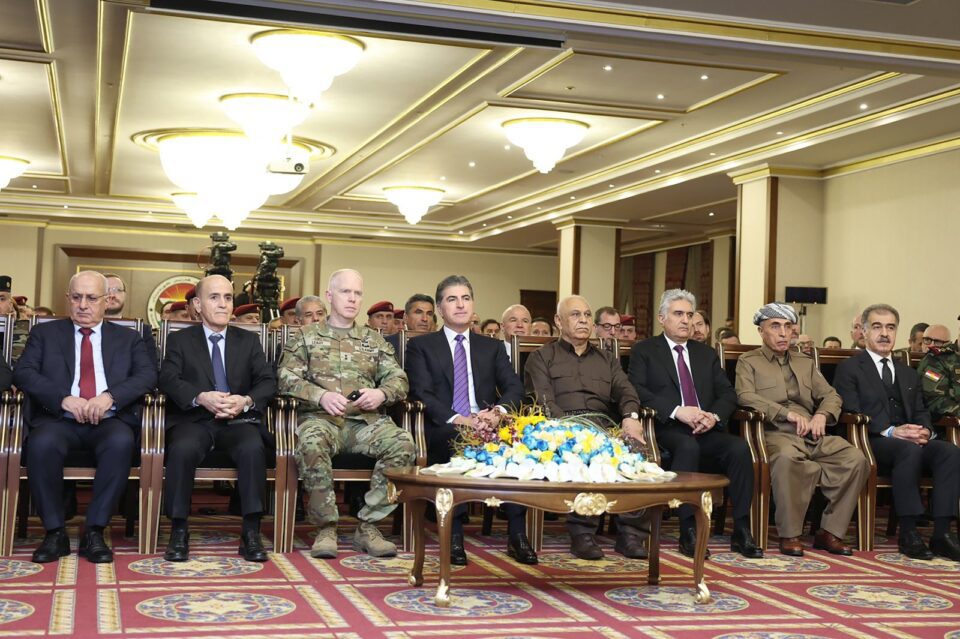New Infantry Divisions Mark Progress in Peshmerga Reform
The Kurdistan Region has taken significant steps forward in its long-standing effort to unify its Peshmerga forces, with the recent inauguration of the 3rd and 4th Infantry Divisions marking a crucial milestone in this complex process.
The Peshmerga, which has been a cornerstone of Kurdish identity and security, has historically been divided along political lines between the Kurdistan Democratic Party (KDP) and the Patriotic Union of Kurdistan (PUK). This division is most notably reflected in Unit 70, aligned with the PUK, and Unit 80, managed by the KDP, which together comprise over 100,000 personnel.
In a ceremony held in Erbil, Kurdistan Region President Nechirvan Barzani emphasized the significance of these new divisions in the ongoing unification efforts. The event, attended by Major General Kevin Leahy, Commander of the Combined Joint Task Force — Operation Inherent Resolve, along with other senior officials, represents a concrete step toward creating a more cohesive military structure.
The Ministry of Peshmerga’s recent announcement of plans to establish two operational command centers overseeing 11 military divisions reflects the broader reform initiative. This restructuring aims to transform the Peshmerga into a professional, transparent force that serves as an integral component of Iraq’s defense system.
Political Divisions and Historical Context: KDP, PUK, and the Legacy of Unit 70 and 80
The Peshmerga’s history is deeply intertwined with Kurdish revolutionary movements and the defense of Kurdistan’s peoples. The force gained greater international recognition during the fight against ISIS, where it played a crucial role under the leadership of President Masoud Barzani. This campaign demonstrated the Peshmerga’s capability not only in protecting Kurdistan but also in defending peaceful coexistence among all communities in the region.
International Support and Reform: Coalition Backing for a Modern Defense Force
International support has been instrumental in the reform process. The US-led International Coalition, including the United Kingdom, Germany, the Netherlands, Hungary, Italy, and France, has provided significant assistance through training, military equipment, and logistical support. These nations have helped establish fundamental principles for integrating the Peshmerga within the Ministry of Peshmerga Affairs’ framework.
Kurdistan Region President Nechirvan Barzani acknowledged this crucial partnership, stating: “The success we celebrate today could not have been realized without the invaluable assistance of our partners within the International Coalition, who have played a crucial role in the reunification initiatives. This includes enhancing the capabilities of the Peshmerga through various means, such as training, the supply of military equipment, and logistical support.”
However, despite these advances and international backing, the unification process faces substantial challenges. The forces continue to show significant partisanship in both their organizational structure and loyalty. While several brigades from both the PUK and KDP have been integrated into the ministry, complete unification remains a distant goal.
Kurdistan Region President called for increased collaboration between the KDP and PUK to ensure the reform process’s success, emphasizing that the Peshmerga must function as a national entity free from political and party influences. The president acknowledged that while the pace of reform might not meet all expectations, the commitment to the process remains unwavering.
The reform initiative also seeks to strengthen coordination between the Peshmerga and the Iraqi army forces. Kurdish leadership has urged the Iraqi Federal Government to fulfill its constitutional obligations toward the Peshmerga as an integral part of the Iraqi defense system.
Challenges and Progress: New Infantry Divisions Signal Path Forward
The significance of this unification effort extends beyond military reorganization. It represents a crucial step toward building a more stable and secure Kurdistan Region, with a professional military force capable of addressing contemporary security challenges. The Ministry of Peshmerga Affairs’ oversight of these forces aims to ensure they remain equipped to address any threats to regional security while maintaining peace and stability.
As the Kurdistan Region navigates through various political and security challenges, the successful unification of the Peshmerga stands as a critical test of its institutional maturity and political will. While progress has been made with the establishment of new divisions and command structures, the road ahead requires continued commitment from all political actors and sustained international support.
The transformation of the Peshmerga from politically divided units into a unified, professional force under centralized control remains a key priority for the Kurdistan Regional Government, reflecting both the aspirations of the Kurdish people and the requirements of modern security challenges in the region.
By Jawad Qadir

